Time for a Change. It’s Only a Change of Time.
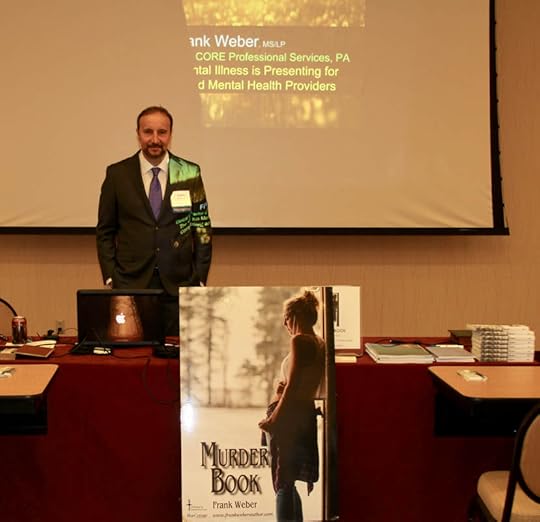 Frank speaking at the MNATSA Conference
Frank speaking at the MNATSA Conference 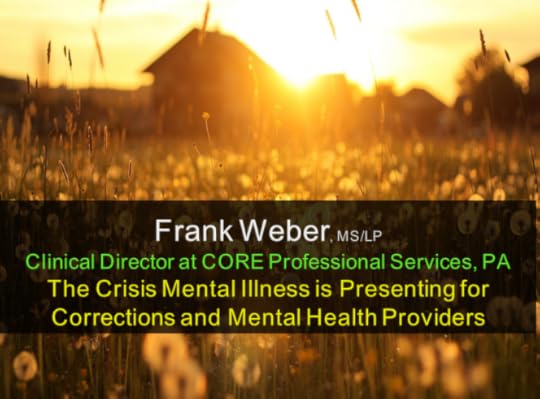 I firmly believe that if we put more money into therapy for mental illness, it would save a significant amount of money and many victims in the long run. I’ll outline the problem, and then offer some solutions. Here’s an analogy of our current efforts. You have a daughter you want to be a great cello player or a great basketball player. Instead of buying her a cello or a basketball, and offering her lessons, you take her to visit a nursing home, and then give her a bus ride to Ely. When you see she isn’t making progress, you send her detention. If you shared this strategy with friends, they would say, “Are you nuts? What you’re doing has nothing to do with playing cello or learning basketball.” But this is how we are dealing with mental illness.
I firmly believe that if we put more money into therapy for mental illness, it would save a significant amount of money and many victims in the long run. I’ll outline the problem, and then offer some solutions. Here’s an analogy of our current efforts. You have a daughter you want to be a great cello player or a great basketball player. Instead of buying her a cello or a basketball, and offering her lessons, you take her to visit a nursing home, and then give her a bus ride to Ely. When you see she isn’t making progress, you send her detention. If you shared this strategy with friends, they would say, “Are you nuts? What you’re doing has nothing to do with playing cello or learning basketball.” But this is how we are dealing with mental illness. 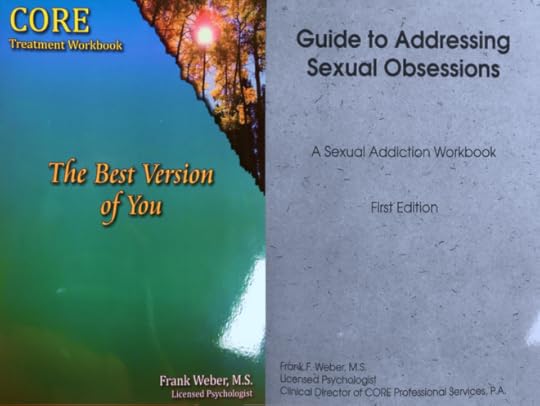 Frank wrote the first workbook for use with sex offender treatment. The second workbook is a list of assignments for 75 days for individuals who struggle with pornography addiction or excessive sexual behavior.
Frank wrote the first workbook for use with sex offender treatment. The second workbook is a list of assignments for 75 days for individuals who struggle with pornography addiction or excessive sexual behavior.  President Obama shared his concern that we need to address gun issues and mental illness more effectively to prevent school shootings from continuing to repeat.
President Obama shared his concern that we need to address gun issues and mental illness more effectively to prevent school shootings from continuing to repeat.  President Trump identifying the mental illness concerns.
President Trump identifying the mental illness concerns. 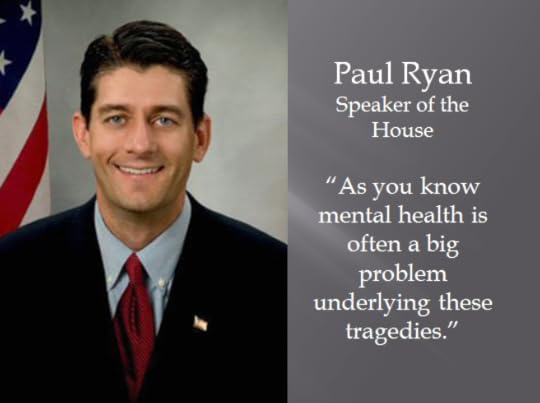 Paul Ryan acknowledging mental health concerns.
Paul Ryan acknowledging mental health concerns.  We have identified groups of people who need help. 83% of everyone who attends high school graduates, yet the majority of sex offenses in MN and nationally are committed by high school dropouts. 60% of sex offenses are committed by the 17% that drop out.
We have identified groups of people who need help. 83% of everyone who attends high school graduates, yet the majority of sex offenses in MN and nationally are committed by high school dropouts. 60% of sex offenses are committed by the 17% that drop out. 
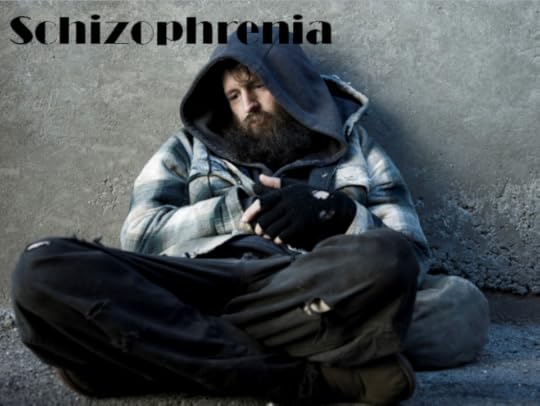 If you define serious mental illness as schizophrenia, bipolar disorder and major depression, it costs $193 billion in lost earnings in a year.
If you define serious mental illness as schizophrenia, bipolar disorder and major depression, it costs $193 billion in lost earnings in a year. 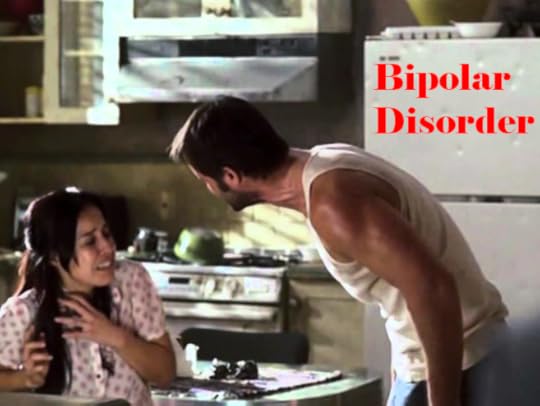 Bipolar individuals need to step away to calm down. Talking continues to escalate them.
Bipolar individuals need to step away to calm down. Talking continues to escalate them. 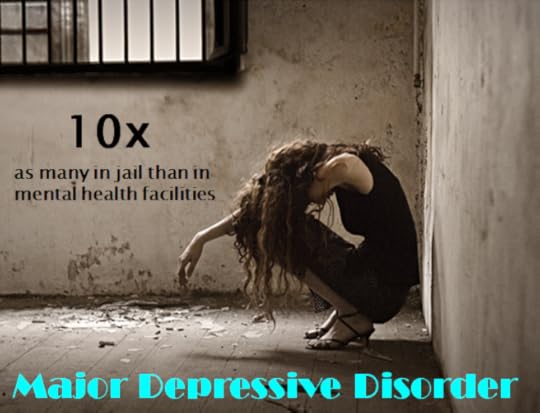

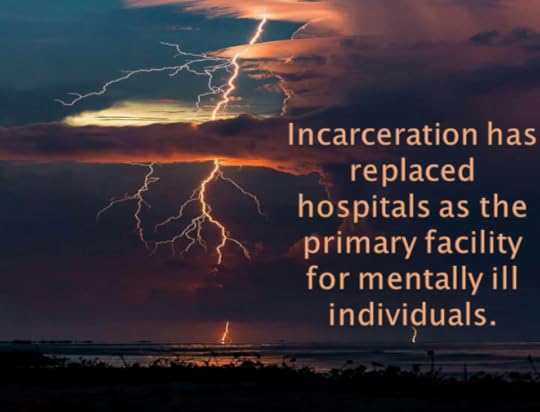 Every county that has both a mental health facility and a jail, has more mentally ill people in the jail. The jails in Chicago (Cook County), Los Angeles (LA County) and New York (Reiker’s Island) each hold more mentally ill people than the largest facility for treating mental illness in the US.
Every county that has both a mental health facility and a jail, has more mentally ill people in the jail. The jails in Chicago (Cook County), Los Angeles (LA County) and New York (Reiker’s Island) each hold more mentally ill people than the largest facility for treating mental illness in the US.  Mentally ill individuals struggle with following rules, commit more rule violations, so they lose their good time.
Mentally ill individuals struggle with following rules, commit more rule violations, so they lose their good time.  The medication for mentally ill people in jail exceeds the costs of feeding everyone in jail. They require more staff time. This doesn’t include the lawsuits. For example: A mentally ill stockbroker was beat to death by other inmates and his family successfully sued the New Jersey county jail for not preventing it.
The medication for mentally ill people in jail exceeds the costs of feeding everyone in jail. They require more staff time. This doesn’t include the lawsuits. For example: A mentally ill stockbroker was beat to death by other inmates and his family successfully sued the New Jersey county jail for not preventing it. 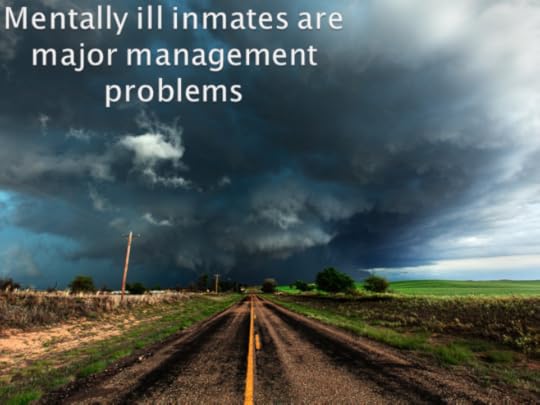 A mentally ill inmate suffered from PICA (eating inedibles), resulting in having his stomach pumped numerous times and 2 surgeries.
A mentally ill inmate suffered from PICA (eating inedibles), resulting in having his stomach pumped numerous times and 2 surgeries.  So more jail staff time is spent on suicide watches.
So more jail staff time is spent on suicide watches. 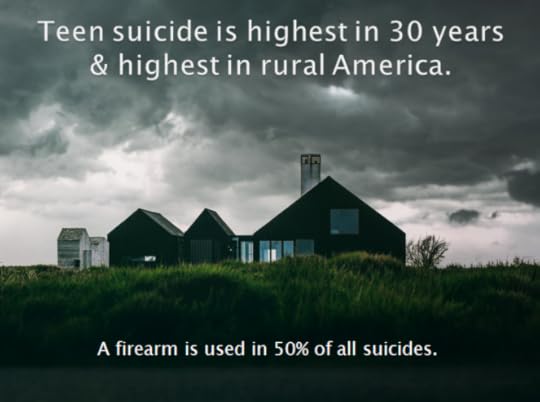 This is a problem in our schools too.
This is a problem in our schools too. 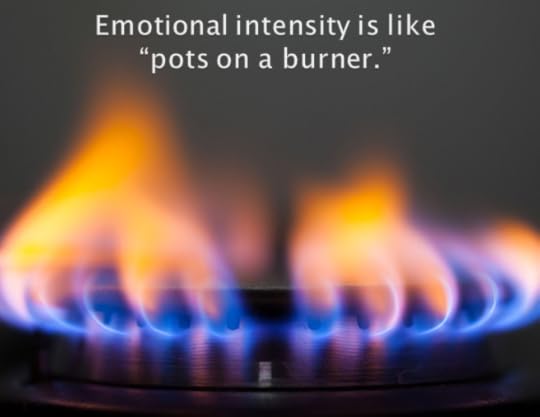 I tell people that for some, “When the engine overheats, the brakes don’t work," so they need to learn to turn down the heat. It doesn’t immediately dissipate. You step away and gradually cool down.
I tell people that for some, “When the engine overheats, the brakes don’t work," so they need to learn to turn down the heat. It doesn’t immediately dissipate. You step away and gradually cool down. 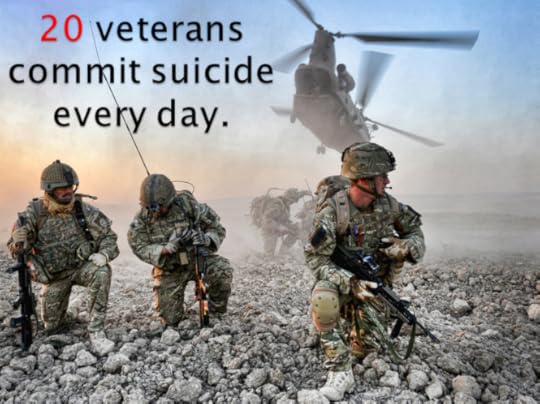 This is a national tragedy we need to address.
This is a national tragedy we need to address.  One of the new strategies is group therapy with veterans, as veterans are notoriously good at looking out for others. But they typically don’t tell family or friends of their struggle so part of the solution is being honest with those close. There is a safety plan phone app for veterans.
One of the new strategies is group therapy with veterans, as veterans are notoriously good at looking out for others. But they typically don’t tell family or friends of their struggle so part of the solution is being honest with those close. There is a safety plan phone app for veterans.  So the Department of Human Services decided to take a look at how well jails were dealing with this. Their conclusion:
So the Department of Human Services decided to take a look at how well jails were dealing with this. Their conclusion: 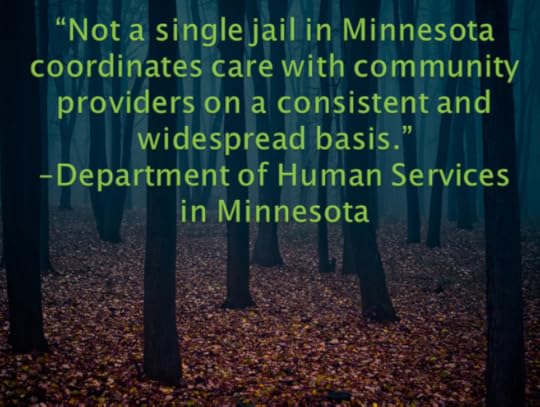 People are discharged from jail with nowhere to go, which drastically increases the odds that they are going to be rearrested. It’s not fair to blame the jails, as they have no place to send people.
People are discharged from jail with nowhere to go, which drastically increases the odds that they are going to be rearrested. It’s not fair to blame the jails, as they have no place to send people.  Once juveniles are placed in detention, they are actually less likely to get mental health help, which increases their risk of rearrest.
Once juveniles are placed in detention, they are actually less likely to get mental health help, which increases their risk of rearrest. 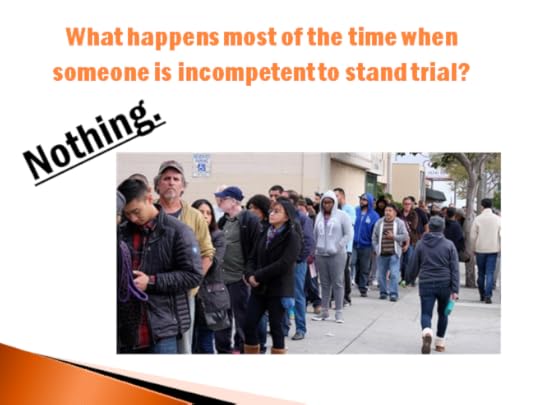 I took a look at 1 year in Hennipen County. 119 people were found incompetent to stand trial for their crimes. 46 were civilly committed. No resolution was reached on 4 cases. 7 received a stay of commitment, meaning if they stay out of trouble the charges will be dropped. 62 were released with nothing. Think about this. Someone robs your store. You call the police and they are arrested. They are found incompetent to face the charges so they are released with nothing. So what do you think happens next? They keep committing crimes. They call them “gap patients”—not crazy enough to require placement, but just crazy enough to commit crimes. This costs us a lot of money in the long run. For Example: Jack McClellan is a veteran who came to Hennepin County’s mental health system the usual way—he was arrested. (He had committed 2 thefts, 2 trespassing and an indecent exposure crime.) He was found incompetent to face charges, but was not civilly committed because he was not suicidal and not a threat to abuse others. The judge expressed concern that Jack was homeless and it was November in Minnesota. Jack was back in court in February with 4 more trespassing and theft charges, now wearing medical boots because he had frozen his feet. So now we are paying expensive medical bills because we didn’t have a system to address crisis mental illness.
I took a look at 1 year in Hennipen County. 119 people were found incompetent to stand trial for their crimes. 46 were civilly committed. No resolution was reached on 4 cases. 7 received a stay of commitment, meaning if they stay out of trouble the charges will be dropped. 62 were released with nothing. Think about this. Someone robs your store. You call the police and they are arrested. They are found incompetent to face the charges so they are released with nothing. So what do you think happens next? They keep committing crimes. They call them “gap patients”—not crazy enough to require placement, but just crazy enough to commit crimes. This costs us a lot of money in the long run. For Example: Jack McClellan is a veteran who came to Hennepin County’s mental health system the usual way—he was arrested. (He had committed 2 thefts, 2 trespassing and an indecent exposure crime.) He was found incompetent to face charges, but was not civilly committed because he was not suicidal and not a threat to abuse others. The judge expressed concern that Jack was homeless and it was November in Minnesota. Jack was back in court in February with 4 more trespassing and theft charges, now wearing medical boots because he had frozen his feet. So now we are paying expensive medical bills because we didn’t have a system to address crisis mental illness.  Some counties buy a mentally ill person a bus ticket to the next county where the person then becomes someone else’s problem.
Some counties buy a mentally ill person a bus ticket to the next county where the person then becomes someone else’s problem.  Putting young people with difficulty regulating their emotions with vulnerable adults, simply because we don’t have MI beds is a terrible solution.
Putting young people with difficulty regulating their emotions with vulnerable adults, simply because we don’t have MI beds is a terrible solution. 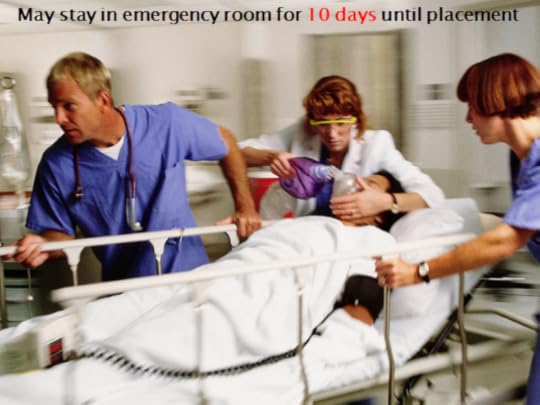 If they go to an emergency room for a psychotic episode, and the physician feels they are not safe enough to release, they stay in the emergency room until an opening occurs. They don’t admit them to the hospital, for fear they will never get rid of them, so they sit behind the curtains, often talking loudly, while crisis medical cases are addressed around them.
If they go to an emergency room for a psychotic episode, and the physician feels they are not safe enough to release, they stay in the emergency room until an opening occurs. They don’t admit them to the hospital, for fear they will never get rid of them, so they sit behind the curtains, often talking loudly, while crisis medical cases are addressed around them. 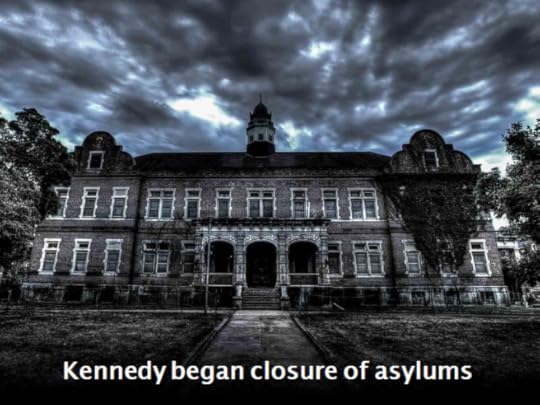 This all got started when John Kennedy decided we needed to close asylums and the states began the 20 year process. Reform was certainly needed. Kennedy stated we need to provide community resources instead, which clearly hasn’t occurred to the degree needed.
This all got started when John Kennedy decided we needed to close asylums and the states began the 20 year process. Reform was certainly needed. Kennedy stated we need to provide community resources instead, which clearly hasn’t occurred to the degree needed. 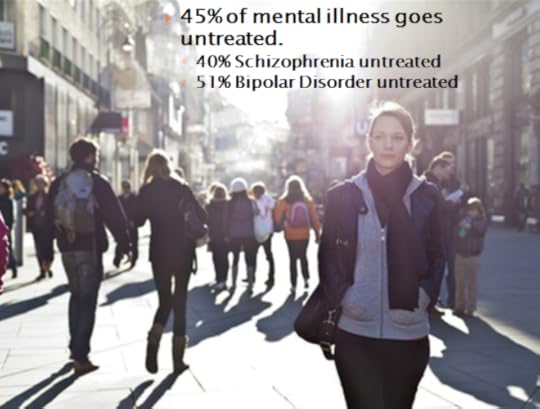 Schizophrenia is the most debilitating of all mental illnesses, still 25% show good recovery and 75% show improvement. The success rate for treating bipolar disorder is 80%. Our society would be far better if we provided people access to affordable mental health services.
Schizophrenia is the most debilitating of all mental illnesses, still 25% show good recovery and 75% show improvement. The success rate for treating bipolar disorder is 80%. Our society would be far better if we provided people access to affordable mental health services.  Only 15% of law enforcement officers have training in addressing mental illness and most received that training independently. An officer is 2X as likely to get killed in a domestic call than in a drug bust. Often they’re dealing with at least one person with mental illness concerns in domestic arguments.
Only 15% of law enforcement officers have training in addressing mental illness and most received that training independently. An officer is 2X as likely to get killed in a domestic call than in a drug bust. Often they’re dealing with at least one person with mental illness concerns in domestic arguments. 
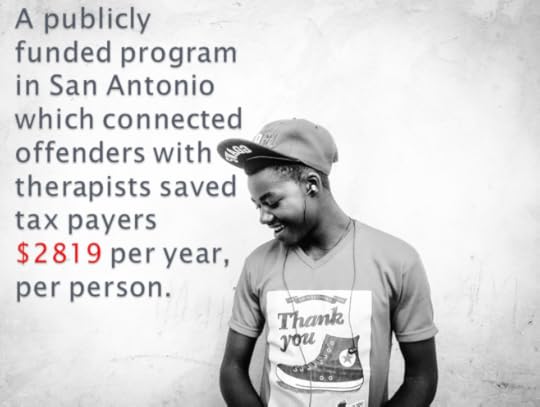 We need to start looking at the overall cost to the taxpayer, rather than department budgets. When San Antonio combined the costs of social services and corrections they realized that some people cost taxpayers a lot of money. So they gave probation officers smaller caseloads, and the task of helping make sure clients get to counseling sessions. Ultimately, it saved almost $3000 a person, every year.
We need to start looking at the overall cost to the taxpayer, rather than department budgets. When San Antonio combined the costs of social services and corrections they realized that some people cost taxpayers a lot of money. So they gave probation officers smaller caseloads, and the task of helping make sure clients get to counseling sessions. Ultimately, it saved almost $3000 a person, every year. 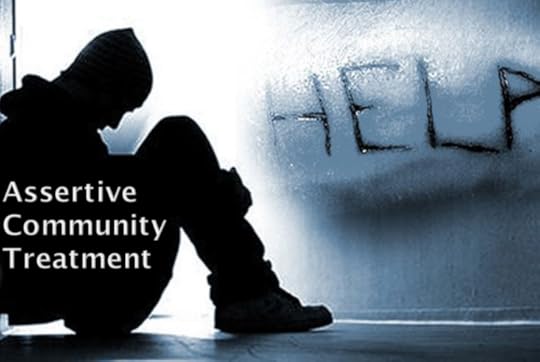 Some states have Assertive Community Treatment programs which basically employs professionals to help in any way possible to keep clients functioning in the community. These programs ultimately pay for themselves, by saving taxpayers the cost of jail and inpatient placements. Unfortunately, these programs are typically the first to get cut when budgets are tight.
Some states have Assertive Community Treatment programs which basically employs professionals to help in any way possible to keep clients functioning in the community. These programs ultimately pay for themselves, by saving taxpayers the cost of jail and inpatient placements. Unfortunately, these programs are typically the first to get cut when budgets are tight. 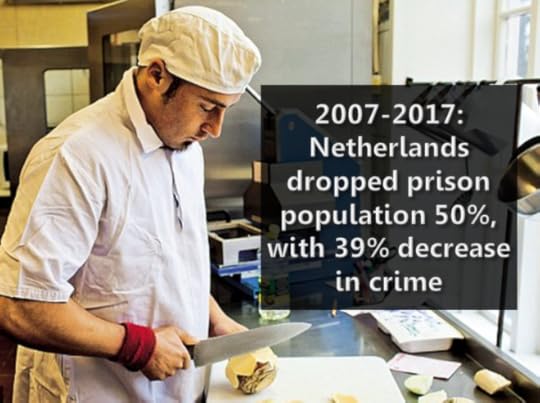 Netherlands changed the jails and prisons to vocational training programs. Even though it’s more expensive initially, it saves a lot of money in the long run. I believe that people who are incarcerated should only earn good time by working.
Netherlands changed the jails and prisons to vocational training programs. Even though it’s more expensive initially, it saves a lot of money in the long run. I believe that people who are incarcerated should only earn good time by working. 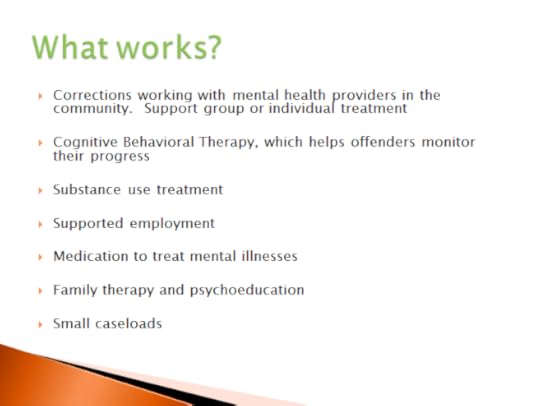
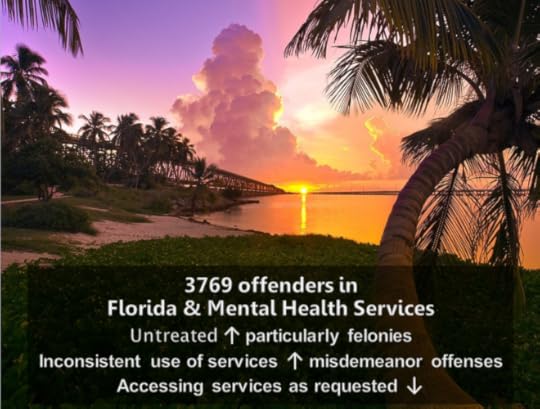 A study in Florida found that offenders who don’t receive mental health help are the most likely to be convicted of felonies. Offenders who attend therapy inconsistently are most likely to be convicted of misdemeanors. Offenders who access mental health services as requested are the least likely to be arrested again.
A study in Florida found that offenders who don’t receive mental health help are the most likely to be convicted of felonies. Offenders who attend therapy inconsistently are most likely to be convicted of misdemeanors. Offenders who access mental health services as requested are the least likely to be arrested again.  Sociologist Travis Hirshi found there are 4 factors that reduce deviance. 1. Attachment to a healthy person—lover, friend, parent 2. Involvement in employment or school 3. Commitment to pursuing a better life (job, hobbies, etc.) 4. Belief (in God or strong moral beliefs)
Sociologist Travis Hirshi found there are 4 factors that reduce deviance. 1. Attachment to a healthy person—lover, friend, parent 2. Involvement in employment or school 3. Commitment to pursuing a better life (job, hobbies, etc.) 4. Belief (in God or strong moral beliefs) 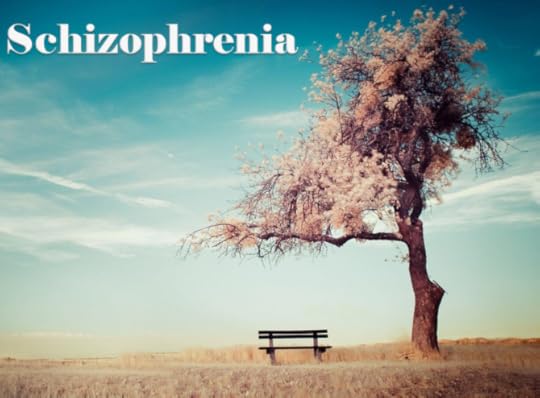 Think of each psychotic episode as a stroke that does more damage and takes more medication to recover from. This is why failing to take medication regularly is a big problem. The positive is that it works.
Think of each psychotic episode as a stroke that does more damage and takes more medication to recover from. This is why failing to take medication regularly is a big problem. The positive is that it works.  You can’t counsel people out of a psychotic episode or severe paranoia. They need medication. It works slowly, but it works. For example: I counseled a teenager with schizophrenia who raced home from school every day, hiding behind cars on the way out of fear someone was trying to kill him. After 2 weeks on antipsychotic medication he was telling me that people are following him, but it’s just people doing it for a joke. 2 weeks after that, he acknowledged no one was really following him.
You can’t counsel people out of a psychotic episode or severe paranoia. They need medication. It works slowly, but it works. For example: I counseled a teenager with schizophrenia who raced home from school every day, hiding behind cars on the way out of fear someone was trying to kill him. After 2 weeks on antipsychotic medication he was telling me that people are following him, but it’s just people doing it for a joke. 2 weeks after that, he acknowledged no one was really following him.  I ask bipolar individuals to keep track of their mood (1 as very depressed and 10 as hyperactive) every waking hour for 10 days. They quickly see how their mood effects their behavior and their soon telling me, “When I’m at a 2 (or for others at an 8), I always get in trouble.” This recognition is important to learning to rein it in so they don’t get in trouble.
I ask bipolar individuals to keep track of their mood (1 as very depressed and 10 as hyperactive) every waking hour for 10 days. They quickly see how their mood effects their behavior and their soon telling me, “When I’m at a 2 (or for others at an 8), I always get in trouble.” This recognition is important to learning to rein it in so they don’t get in trouble.  On medication, bipolar individuals function well in society. I do tell them to get advice from 2 healthy people, or wait 48 hours, before making a major decision such as ending a relationship or purchasing a car, as they are impulsive in manic states.
On medication, bipolar individuals function well in society. I do tell them to get advice from 2 healthy people, or wait 48 hours, before making a major decision such as ending a relationship or purchasing a car, as they are impulsive in manic states.  If a depressed person can commit to therapy, and taking medication if it is requested, for 9 months most people will never need therapy or medication again. The trick is to get people to follow through instead of quitting after they first feel better. Depression needs to be brought to resolution.
If a depressed person can commit to therapy, and taking medication if it is requested, for 9 months most people will never need therapy or medication again. The trick is to get people to follow through instead of quitting after they first feel better. Depression needs to be brought to resolution.  Exercise and diet are helpful to everything. Exercise is more effective in fighting depression than either therapy or medication. Fortunately, they are not exclusive.
Exercise and diet are helpful to everything. Exercise is more effective in fighting depression than either therapy or medication. Fortunately, they are not exclusive.  Murder Book continues to sell well, and the sequel, The I-94 Murders is completely finished and now at the publisher. Quotes: (more from Mitch Hedberg)
Murder Book continues to sell well, and the sequel, The I-94 Murders is completely finished and now at the publisher. Quotes: (more from Mitch Hedberg)My sister wanted to be an actress. She never made it, but she does live in a trailer, so she got half way. So she's like an actress, who never gets called to the set.
If you go to the grocery store and you stand in front of the lunch meat section for too long, you start to get pissed off at turkeys. You see, turkey ham, turkey pastrami, turkey bologna. Somebody needs to tell the turkeys, "Man, just be yourself!"
Sometimes I wave to people I don't know. But then I worry, “What if they only have one arm? They'll think I’m being cocky.”
My friend came up to me and he said "Hey, you know what I like? Mashed potatoes." It was like, "Dude, you gotta give me time to guess. If you're gonna quiz me, you gotta put a pause in there.
Thanks for listening!
Frank This weekend my brother Charlie and I played some music with Rosetta (mom). Charlie played this, knowing I occasionally like songs that are more existential. It’s a song you can enjoy if you can relax and let yourself get lost in the metaphors. I particularly like the last verse and the point that a strong relationship can keep you going through the hard times. Josh is actor John Ritter’s son. Great song, although I think Charlie does it better.


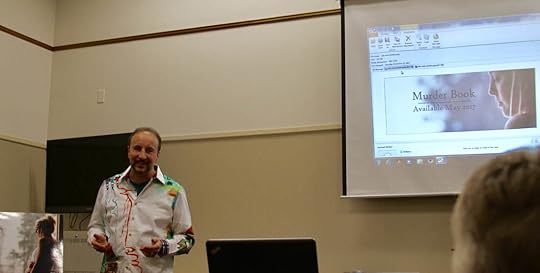
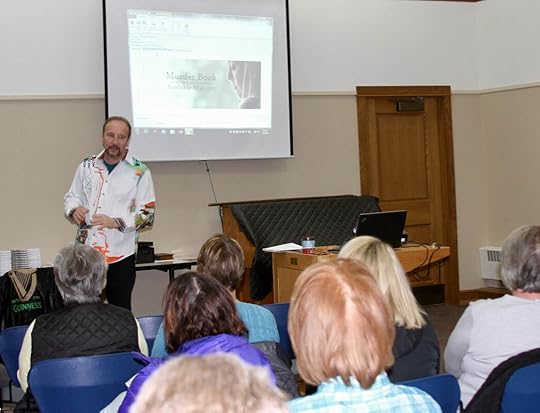 Frank speaking at the Detroit Lakes Public Library
Frank speaking at the Detroit Lakes Public Library 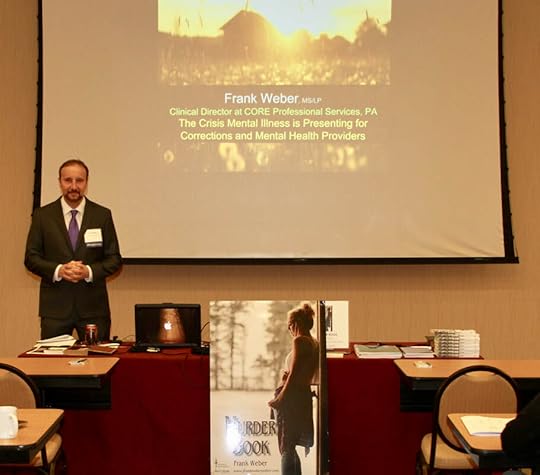 CORE Professional Services provides a variety of counseling services for couples, for depression, for parenting concerns and psychological assessments on various issues. The CORE sex offender treatment program has demonstrated success. 97% of offenders who have graduated from this program have not been convicted of an offense again, in their 22 years of programming. Frank pointed out in his presentation that CORE sites where they can offer more individual therapy in conjunction with group work they have the greatest success rates (99%), and offenders also graduate the quickest (13 months) from this program. If we had the grants to offer more individual sessions, it would cost tax payers less in the long run and it would save more victims. As a society, we need to get better at considering preventive strategies.
CORE Professional Services provides a variety of counseling services for couples, for depression, for parenting concerns and psychological assessments on various issues. The CORE sex offender treatment program has demonstrated success. 97% of offenders who have graduated from this program have not been convicted of an offense again, in their 22 years of programming. Frank pointed out in his presentation that CORE sites where they can offer more individual therapy in conjunction with group work they have the greatest success rates (99%), and offenders also graduate the quickest (13 months) from this program. If we had the grants to offer more individual sessions, it would cost tax payers less in the long run and it would save more victims. As a society, we need to get better at considering preventive strategies.
Published on April 16, 2018 06:46
No comments have been added yet.



